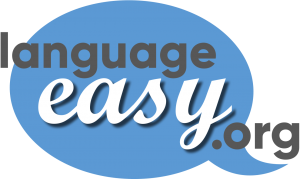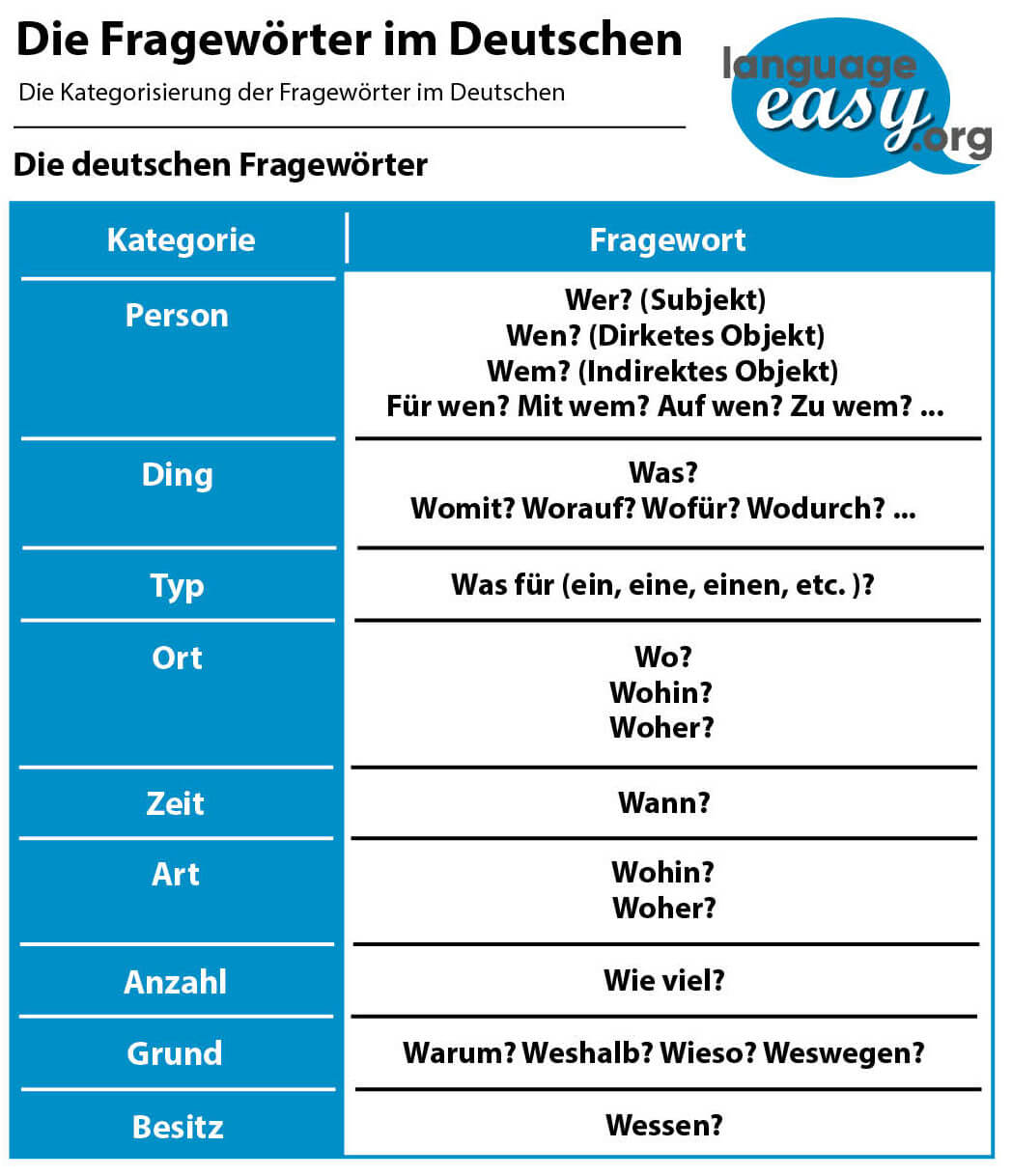German Questions
Fragen im Deutschen – Erklärungen und Beispiele
German Questions – Summary
Zusammenfassung
Closed Questions
Question without a question word, which can be answered with “yes” or “no”, are called closed questions. In this questions, the finite verb is in the first position, followed by the subject in the second position. The other elements of the sentence (Object, time, place, etc.) are in the same order as they would be in a main clause.
- “Habe ich dir einen Hund geschenkt?”
Open Questions
In open question, the question word is normally put at the beginning of the sentence. After that, you put the finite verb and the other elements of the sentence.
- “Wann habe ich dir den Hund geschenkt?”
In questions asking for the object with prepositions, the preposition is put in front of the question word.
- “Mit wem gehst du Gassi?”
In questions for the subject, the finite verb is used in the 3rd person singular
- “Wer hat dir den Hund geschenkt?”
Questions with preposition + “was”
Question with preposition + “was” are more frequently used in every-day language. In every-day language, you prefer using “wo” + preposition.
- “Mit was kann ich helfen?” – “Womit kann ich helfen?”
In case the preposition starts with a vowel, you add a “r” between “wo” and the preposition.
- “An was denkst du?” – “Woran denkst du?”
Indirect Questions
Indirect questions are used in subordinate clauses.
- “Ich weiß nicht, was das ist.”
“Habt ihr Lust, Deutsch zu lernen?”
Well, I hope that the answer to this question is yes. Anyway, I think you don’t have a choice, as you have already clicked on this article about German questions on language-easy.org!
But, don’t worry. First of all, German questions are really not as difficult as you might think. And apart from that, I’ll try to structure this article in way that doesn’t make you suffer too much.
So, German questions are of essential importance, especially in spoken everyday language. As in the English language, the usual sentence structure differs, when a question is formed. Furthermore, there are different types of German question.
In the following, I’d like to clear up what the different types of German questions are. After that, we will have a look at the most common German question words and also talk about question words in combination with various prepositions. So, let’s not lose too much time and start straight ahead with the first part of this article about German questions.
Los geht’s!
Closed and Open Question in German
Entscheidungsfragen und Ergänzungsfragen im Deutschen
So, let’s start with a short definition about what a German question actually is. Of course, all of you know what a question is is, however it’s useful to have it defined clearly.
A German question, also known as interrogative sentences, are used to get information about something.
Well, there are two types of German questions: First, we have the closed questions, also called the ‘yes or no’ questions or “Entscheidungsfragen”.
Apart from that, we have the open questions, also called the ‘w-questions’ or “Ergänzungsfragen”. Of course, the structure of each of these two kinds of German questions is different.
1. Closed Questions / Yes or No Questions (“Entscheidungsfragen”)
Well, the closed German questions can simply be answered by ‘yes or no’. So, in these questions, the finite verb is in the first position of the question. And, after that, subject goes to the second position. Finally, the object, time, etc. come in the same order as they would in a main clause.
- “Hat Philip dir sein Fahrrad gegeben?”
- “Bist du seine Frau?”
- “Hast du heute Zeit?”
2. Open Questions (“Ergänzungsfragen”)
So, this second type of German questions use an interrogative pronoun or a question word. Unfortunately, we can’t answer this type of questions by a simple ‘yes’ or ‘no’. Well, there is an interrogative pronoun that always has to come at the beginning of these sentences. The next to come is the finite verb and then followed by the rest of the sentence elements. So, keep in mind the part of the sentence that we are asking about is replaced by the interrogative pronoun.
- “Wer ist das Mädchen neben Philip?”
Well, in case we are asking about an object with a preposition, the preposition come before the question word.
- “Mit wem fährt Philip im Auto?”
And finally, in case we are asking about the subject, the finite verb takes the third person singular.
- “Wer hat Philip die Autoschlüssel gegeben?”
Typical German Question Words
Typische Frageworte im Deutschen
In this section of the text I’d like to give you a short overview about some German question words. Of course, not all of them are part of this list.

Well, as I have already mentioned, there are many more question words in the German language, not all of them are mentioned in this list.
Questions with “Wo” with prepositions: “Wofür, Womit, Woran”
Actually, this question word can be compared to the English word what, which is also often combined with different prepositions. So, in German we just use the question word “wo” and add the prepositions. Well, the same is possible with the question word “was”.
- “Womit hat Philip gezahlt?”
Exercises
Übungen
Finally, we have reached the last part of this article where you can prove the German skills you have just learned. In the following you will see some phrases that you should complete with the correct terms. Once you have filled all the gaps, just click on the “correct” button and you can see your errors and the correct results. Good luck and… auf Wiedersehen!



